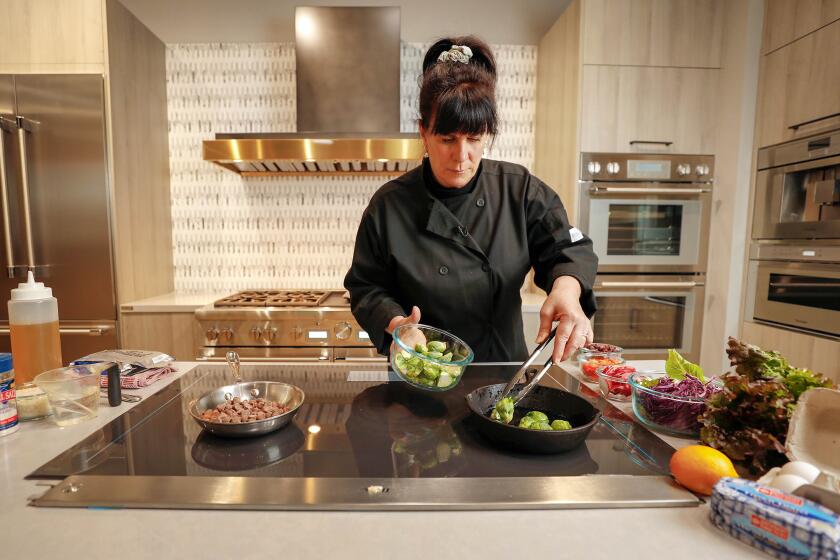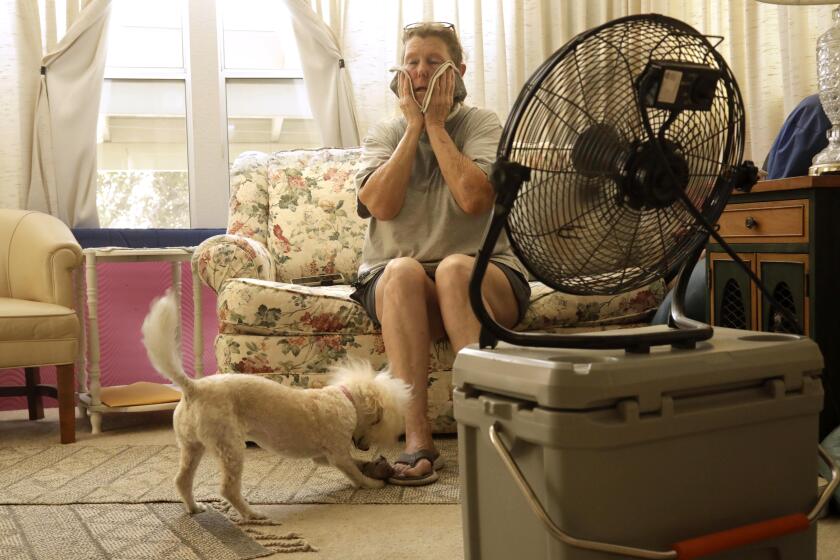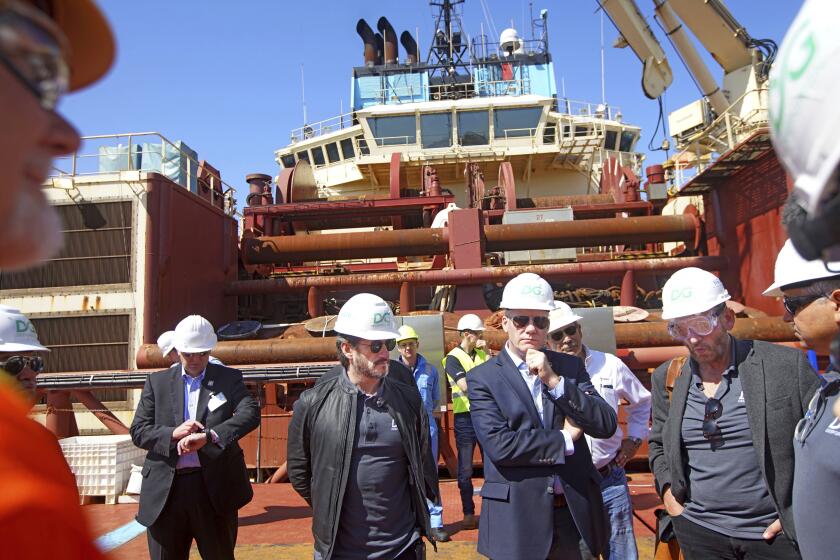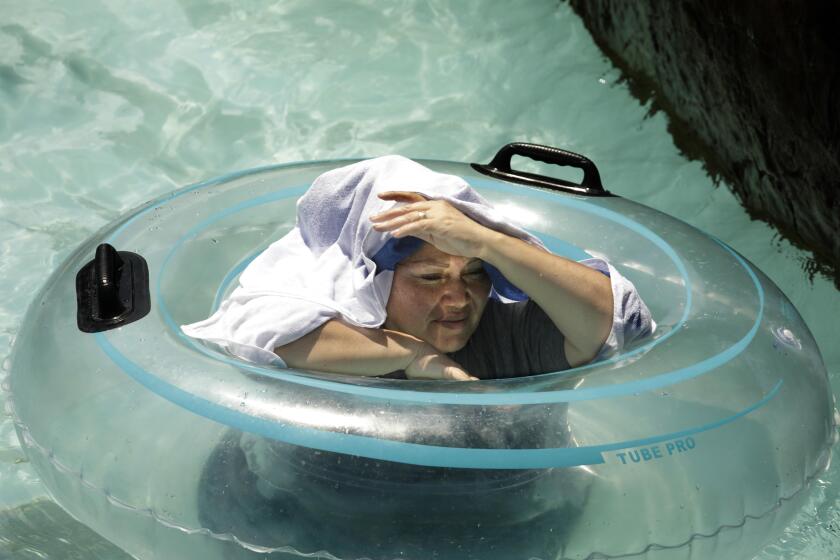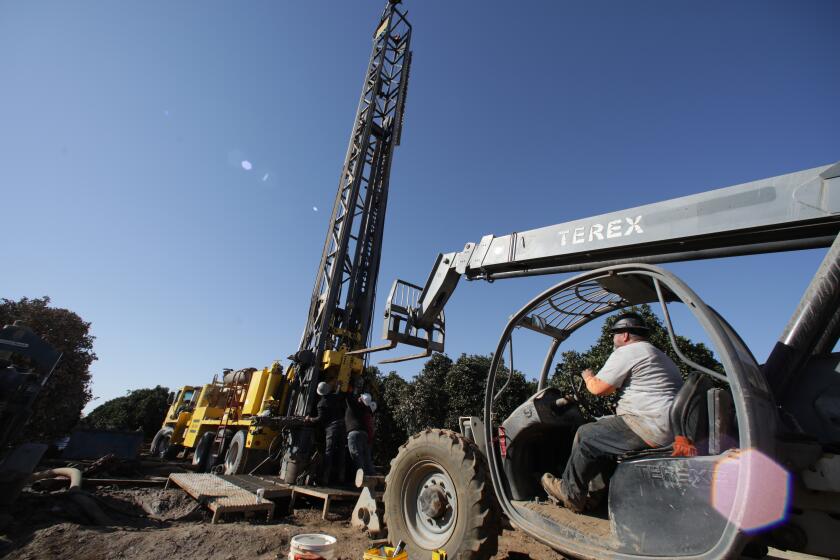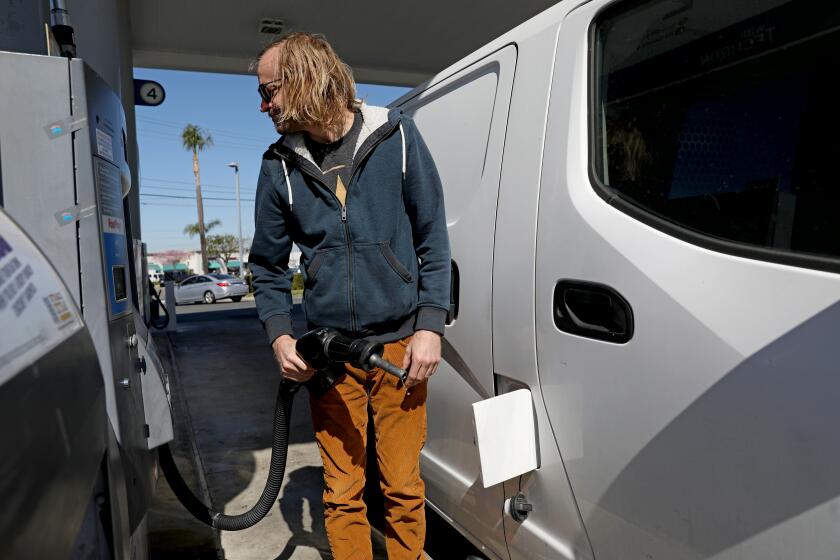Angelenos are alarmed by air pollution and extreme heat. Poll finds they want action
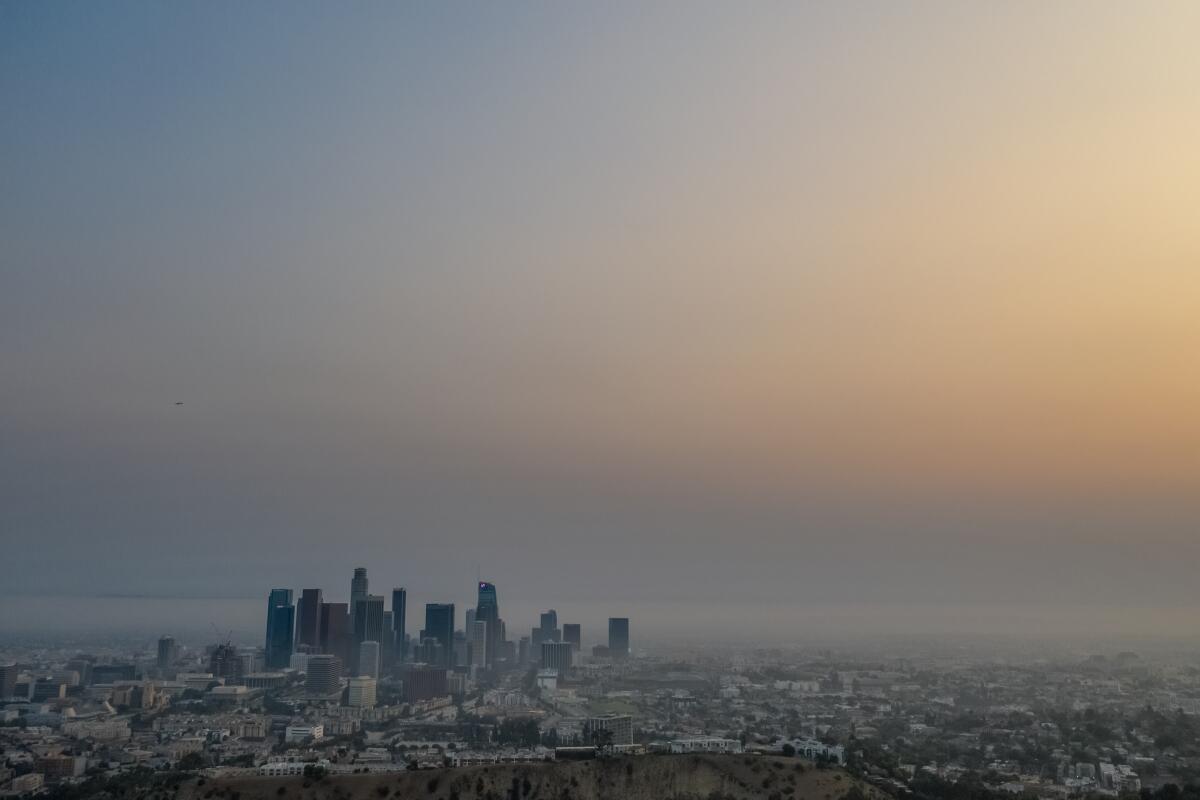
- Share via
Los Angeles voters are alarmed by deadly heat waves, destructive wildfires and dangerous air pollution — and they want politicians to take major steps to reduce the city’s reliance on fossil fuels and prepare for a hotter future.
Nearly two-thirds of L.A. voters say extreme heat poses a serious threat to their health and safety, according to a new UC Berkeley Institute of Governmental Studies poll co-sponsored by the Los Angeles Times. Eight in 10 voters say the same about air pollution, which, like global warming, is caused largely by dirty fuels such as oil and natural gas.
Voters in America’s second-biggest city support action on air quality and the climate crisis, the poll found: Eighty-three percent said Los Angeles County should spend more money to add rail lines, and 60% said the city should convert more traffic lanes to bus only. Half said the City Council should ban gas heating systems and gas stoves in newly built homes, compared with 37% opposed.
Statewide, voters also support big changes to cope with the effects of climate change.
About two-thirds would back restrictions on building housing in high-risk wildfire areas, the poll found.
The numbers come as Angelenos prepare to vote in a June 7 primary for mayor, and as a punishing drought — worsened by rising temperatures — tightens its grip on the state. The poll found that 62% of L.A. voters think the city should save water by removing ornamental grass from roadway medians and landscaping around commercial buildings, as Las Vegas recently required.
But despite widespread support for climate action, the issue isn’t voters’ top priority.
Record heat. Raging fires. What are the solutions?
Get Boiling Point, our newsletter about climate change, the environment and building a more sustainable California.
You may occasionally receive promotional content from the Los Angeles Times.
Asked to identify the one or two most important issues in deciding whom to support for mayor, just 10% of L.A. voters chose climate change. Sixty-one percent said homelessness, 38% said crime and public safety, and 36% said housing affordability. The leading mayoral candidates have focused almost exclusively on those topics.
“The bad news is that climate change and the environment are not that important to most people right now. There are other, more pressing issues on people’s minds,” said Jon Christensen, a UCLA environmental historian. “That said, people do believe the consequences are serious — extreme heat, wildfires, air pollution. And they do favor doing things to address those threats.
“I think people are saying it’s urgent, if half the people are willing to support giving up gas stoves,” he added.
California sparked a national push to ban gas lines into homes. Its success hinges on persuading home cooks the gas stove is obsolete.
Of the two leading candidates for mayor, Rep. Karen Bass only briefly mentions the climate crisis on her campaign website, and billionaire real estate developer Rick Caruso doesn’t mention it at all.
City Council Member Kevin de León, who placed a distant third in the poll, wrote ambitious climate bills when he served in the state Legislature but also hasn’t focused on the topic during his mayoral campaign.
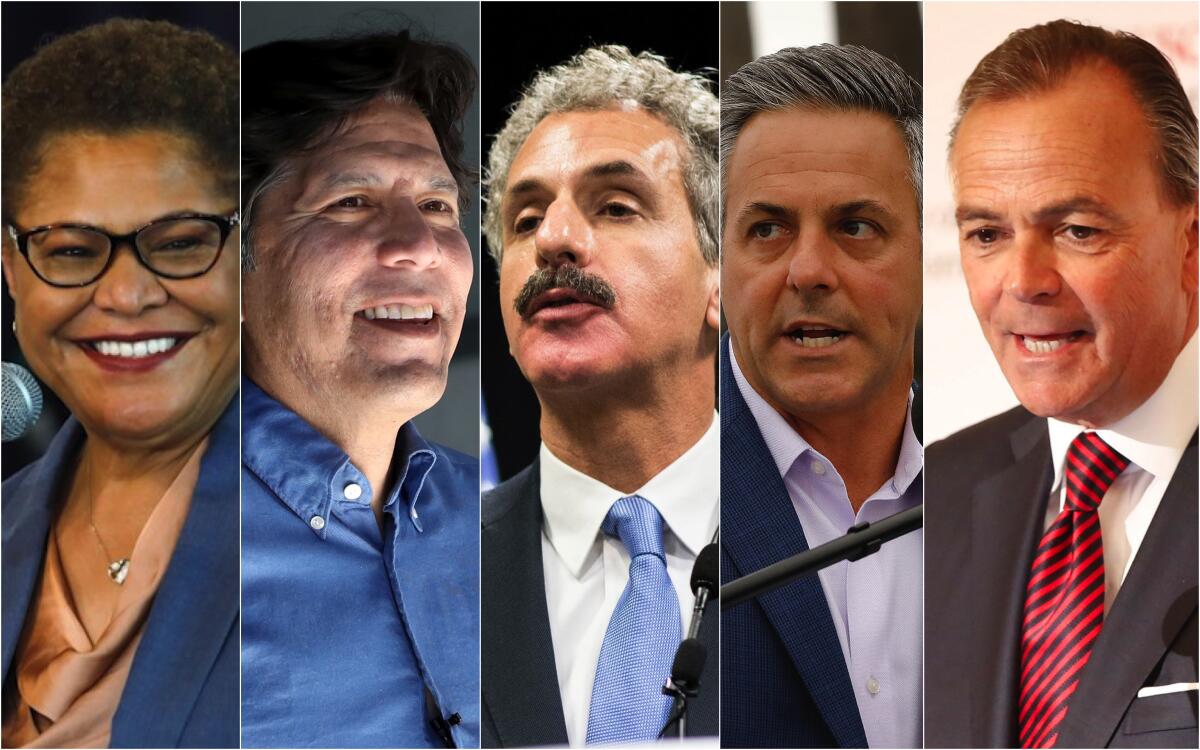
Mike Feuer, the Los Angeles city attorney, is the only mayoral candidate polling above 1% who has laid out a detailed climate plan.
“There is no more important issue for the world,” Feuer said in an interview. “If we were to look forward to a conversation that our kids or grandkids might have in 20 or 30 years, they’re going to look back on us and say, ‘What the heck were you thinking?’”
Those types of conversations are already happening as global warming drives more frequent, higher-intensity wildfires and fuels more dangerous heat waves — posing an especially high risk to the elderly, outdoor workers, low-income families who can’t afford air conditioning and residents of neighborhoods without enough shade trees or public parks, many of whom are people of color.
A recent L.A. Times investigation found that heat killed an estimated 3,900 Californians during the decade ending in 2019 — six times the state’s official tally.
California chronically undercounts the death toll from extreme heat, which disproportionately harms the poor, the elderly and others who are vulnerable.
Latino voters, lower-income voters and those living in the Inland Empire and San Joaquin Valley are more likely to describe extreme heat as a very serious threat, the poll found.
Partisanship sharply divided voters on the issue: Almost 8 in 10 Democrats said extreme heat poses at least a somewhat serious threat to them or their families, but nearly two-thirds of Republicans said it’s not a serious threat.
Latino, Black and lower-income voters showed higher levels of concern about air pollution. Power plants, oil refineries, ports and other industrial facilities that fuel the climate crisis and spew lung-damaging particles are predominantly located in communities of color.
Support our journalism
Your support helps us deliver the news that matters most. Subscribe to the Los Angeles Times.
There’s also robust support across California for restricting housing development in high-risk wildfire zones, the poll found.
Support was highest in the Bay Area, where almost three-quarters of voters are in favor. But even in the largely rural, conservative northern part of the state, voters backed development restrictions 53% to 35%. So did a plurality of Republicans statewide, with 44% in favor and 38% opposed.
That’s a striking finding for a political party that prizes private property rights, especially in a state that badly needs new housing, said Fran Pavley, a Democrat and former state lawmaker who is currently environmental policy director at USC’s Schwarzenegger Institute.
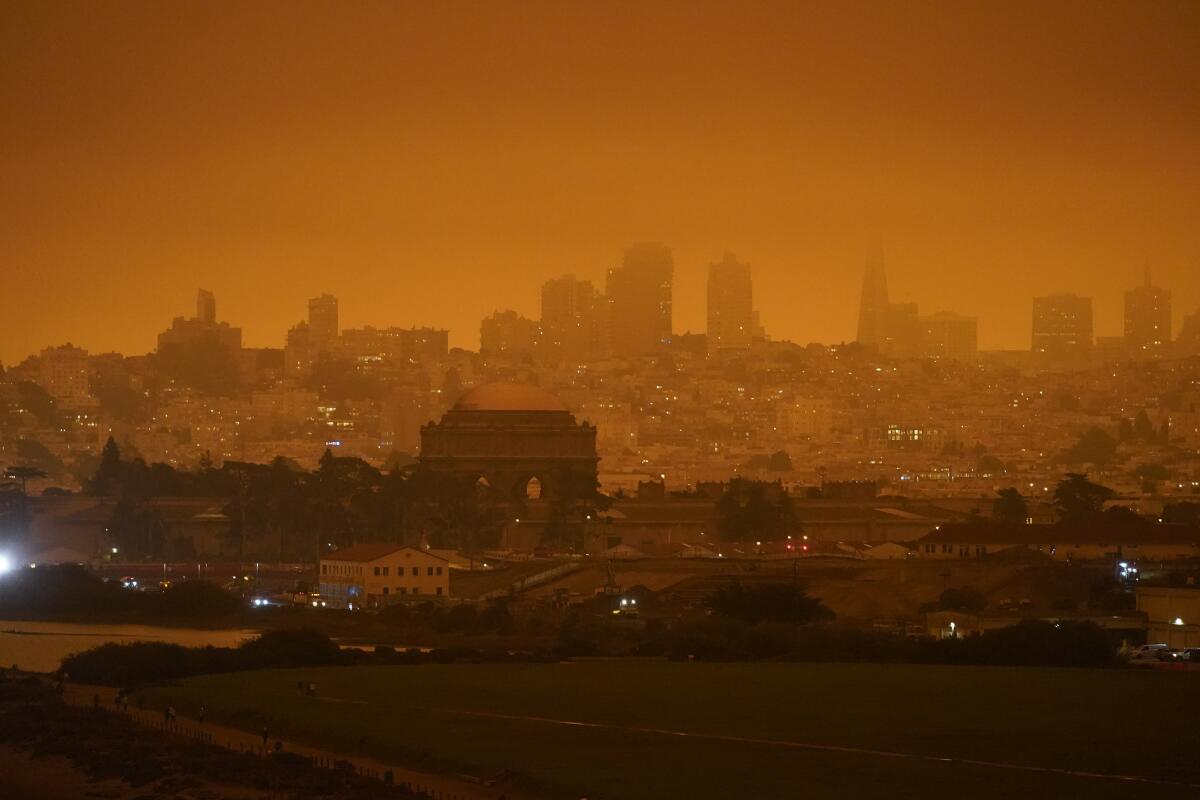
While just 15% of L.A. voters and 24% of voters statewide said they’d been directly affected by fire, the poll asked voters specifically about effects such as having to evacuate or having their power turned off — not wildfire smoke, which has blanketed much of the state in recent years.
“Those wildfires, they don’t care what your political party is,” Pavley said. “People are feeling that they could be anywhere.”
Mining firms want to scrape the seabed for minerals used in electric car batteries. Scientists worry about conflicts of interest with the gatekeeper to mining permits.
Christensen said the poll results showed mayoral candidates could benefit from talking more about the climate crisis — if they frame climate in terms of extreme heat, air pollution, wildfires, drought and other effects that feel urgent to voters.
“Do you care about extreme heat and being able to live comfortably in the city and get around the city comfortably? Do you care about reducing air pollution?” Christensen asked. “Then you’ve got some issues the poll makes clear people really care about.”
More than half of L.A. County residents have avoided going outside due to concerns about wildfire smoke.
Climate solutions can also address quality-of-life issues that voters care about, Christensen said. Expanding public transit and building affordable housing near Metro stations would make it easier for Angelenos to get out of their cars. Adding protected bus and bike lanes would make the city safer by reducing traffic deaths.
Adding more trees, public parks and shade structures at bus stops, meanwhile, would provide protection from heat while making neighborhoods more livable.
Those types of steps would be popular among L.A. voters, the poll found. In addition to showing robust support for more rail lines and bus-only traffic lanes, 52% of poll respondents want to see more bike-only lanes on city streets, versus 38% opposed. And 86% said city officials should place more of a priority on planting trees and developing parks.
Asked about another possible climate solution, 56% of voters statewide said California should keep building a bullet train to connect L.A. to the Bay Area, despite a decade of delays and cost overruns. Thirty-five percent of voters disagreed.
The Institute of Governmental Studies poll surveyed 8,676 California registered voters and 2,047 registered voters in the city of Los Angeles from March 29 to April 5. The poll was administered online in English and Spanish. The estimated margin of error is plus or minus 2 percentage points for the statewide sample and 3 points for the citywide.
The poll also found moderate support for nuclear power — a change from the 1970s and 1980s, when atomic energy became widely unpopular following accidents at Pennsylvania’s Three Mile Island plant and Ukraine’s Chernobyl facility.
By a 44%-37% margin, voters statewide said they support building more nuclear reactors in California, with 19% undecided. Nuclear plants are the nation’s largest source of climate-friendly power, and unlike solar and wind farms, they can generate electricity around the clock.
The state is planning to shutter its last remaining nuclear plant, with Pacific Gas & Electric on track to close the Diablo Canyon facility along the Central Coast in 2025. Thirty-nine percent of voters oppose shutting down Diablo Canyon, with 33% supporting closure and 28% unsure, the poll found.
There’s broader support for California’s new composting law, which requires people to separate food waste for composting — an effort to reduce planet-warming emissions from landfills. Voters statewide favor the law 68%-24%.
The poll also asked Californians to estimate how much of the water used by people in the state goes to agriculture — a lucrative and politically powerful industry, especially in the San Joaquin and Sacramento valleys. Statewide, voters guessed 45% — far less than the nearly 80% of water supplies that agriculture actually consumes.
After being told the actual number, 47% of poll respondents said the state should establish new limits on water use for farms, with 42% opposed.
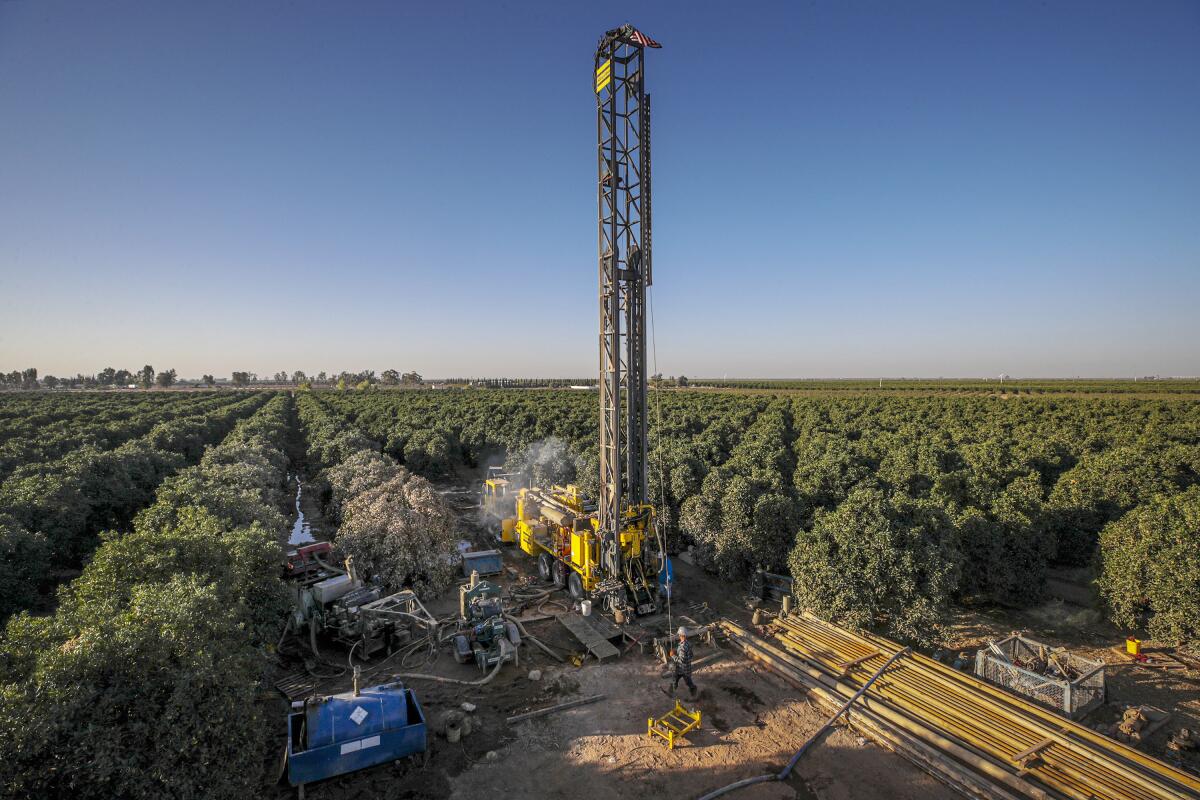
The response differed sharply along partisan and geographic lines. More than three-fifths of Democratic voters said they’d like to see agricultural water use restricted, compared with 1 in 5 Republicans. The strongest support for cutting back on farm water use was in Los Angeles County and the Bay Area, with the lowest support in the Central Valley.
California passed its landmark groundwater law in 2014. The goals of sustainable management remain a long way off.
Water is far from the only controversial climate issue that will confront L.A.’s next mayor.
Adding bus and bike lanes, building affordable housing near public transit, shutting down oil drilling, swapping out gas stoves for induction cooktops — all of it would reduce emissions, but none would be easy. Not in a city defined by freeways and governed by politicians whose most active supporters are often single-family homeowners fiercely opposed to changes in their neighborhoods.
Whoever succeeds Mayor Eric Garcetti at City Hall will need more than platitudes on climate. Scientists say stabilizing the planet’s atmosphere will require the world to cut planet-warming emissions nearly in half by 2030 — at which point Garcetti’s successor could still be finishing a final term in office.
California voters say gas prices are a serious problem as doubts about transit persist, according to a UC Berkeley survey co-sponsored by The Times.
